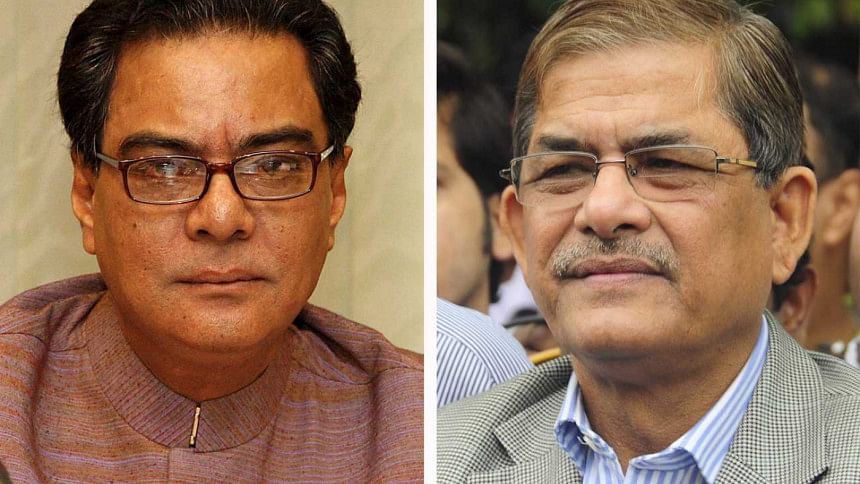Analysis: An ominous sign in politics?

What happened with veteran politicians Syed Ashraful Islam and Mirza Fakhrul Islam Alamgir is unprecedented in the country’s politics since the restoration of democracy in 1991.
Ashraf, general secretary of ruling Awami League, was stripped of his LGRD minister portfolio last Thursday while Fakhrul – Ashraful’s counterpart in AL’s rival party BNP – has been remaining arrested since January 5, a period no general secretary of the either party has ever remained detained for since 1991.
Firstly, take the case of Ashraful. None of the general secretary of a party in power had faced with such a situation in the past.
Even worse, after his removal from ministerial job, question has been raised whether he will be able to finish his term as AL general secretary which ends in December.
Media reports say a section of senior ministers of the Sheikh Hasina-led government have long been working behind the scene to convince Hasina to remove Ashraf from the ministerial job.
Ashraf's inactivity as the minister and the party's general secretary seems to have helped his political foes to move ahead with their agenda to strip him of his LGRD portfolio.
The general secretary of the ruling party is now a minister without portfolio. This means Ashraf remains entitled to all state facilities as a minister but does not have any work to do as a minister. Nothing can be more disgraceful than this for Ashraf, who has the reputation as an honest and dignified politician.
Meantime, much before Ashraf's downfall, Fakhrul, acting secretary general of BNP, started to undergo an appalling situation.
He has been facing around 90 criminal cases, which were filed in connection with street violence during BNP-led agitation against the AL-led government. He has been charged for planning and instigating the violence, torching vehicles and other offences.
And he is in jail since January 5 and struggling to obtain bails.
Fakhrul was detained and had to stay behind bars on several occasions since 2012. But he managed to get released on bails.
Filing political cases against opponents is nothing new, at least in Bangladesh. But the arrests of Fakhrul in 2012 initially came as a surprise as none of his predecessors in the two rival parties – AL and BNP – had to face a situation like this over the last two decades.
Whenever they were in power in turn since 1991, each of the two parties filed countless political cases against its opponent and got many senior and mid-level leaders arrested in their efforts to suppress the opposition's anti-government movement.
In the rule of the game, however, one thing was unofficially agreed upon: none would arrest the rival party's president and secretary general, the top two leaders.
Even when the then BNP-led government launched a crackdown on the opposition men, it refrained from arresting then AL general secretary Abdul Jalil, who had given an April 30 deadline to oust the BNP-led government in 2004.
But things took a different turn with the arrest of Fakhrul.
However his fate may be compared with the situation that that prevailed during the army-backed caretaker government when the emergency regime had launched a crackdown on politicians.
During the emergency rule, AL chief Sheikh Hasina and Jalil were arrested and put behind bars. BNP chief Khaleda Zia had suffered the same while her party's secretary general Khandaker Delwar Hossain, though luckily escaped arrest, had to undergo harassment.
But Ashraf and Fakhrul’s treatment during democratic period is worrisome. It gives a wrong signal to other politicians who have clean images. The prevailing situation also shows there is a complete lack of tolerance and decency in the country's politics.
And these must have infused fresh blood in the confrontational culture of the country's politics.
Isn't it an ominous sign in country's politics? If politicians like Ashraf and Fakhrul has to face such humiliation and sufferings, how will politics take a healthy shape?

 For all latest news, follow The Daily Star's Google News channel.
For all latest news, follow The Daily Star's Google News channel. 



Comments